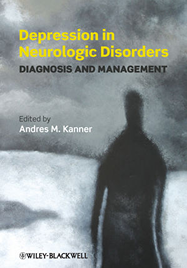Depression in Neurologic Disorders Diagnosis and Management
Material type: TextLanguage: English Publication details: Chichester, West Sussex : Wiley Blackwell, c2012Edition: 1stDescription: XII, 212 p. : illISBN:
TextLanguage: English Publication details: Chichester, West Sussex : Wiley Blackwell, c2012Edition: 1stDescription: XII, 212 p. : illISBN: - 9781444330588
- 616.8527 KAN
| Item type | Current library | Shelving location | Call number | Copy number | Status | Date due | Barcode |
|---|---|---|---|---|---|---|---|
 Reference Collection
Reference Collection
|
LEJ Campus Library | LEJ Campus | 616.8527 KAN | 2022-23 | Available | 98200 |
Andres Kanner, MD, Professor of Neurological Sciences and Psychiatry, Rush Medical College at Rush University; Director, Laboratory of Electroencephalography and Video-EEG-Telemetry; Associate Director, Section of Epilepsy and Rush Epilepsy Center, Rush University Medical Center, Chicago, IL, USA.
Professor Andres Kanner was educated in Mexico City but completed his training at the prestigious College of Physicians and Surgeons of Columbia University in New York City and Cleveland Clinic Foundation, Ohio. He specialized in psychiatry but took a special interest in neurologic disease, in particular epilepsy. As a result he is triple boarded in neurology, psychiatry and clinical neurophysiology. His research has focused on the surgical and pharmacologic treatment of refractory epilepsy and has become an internationally recognized authority in psychiatric issues in epilepsy.He has authored more than 100 articles and has co-edited textbooks on various aspects of epilepsy, psychiatry and depression.
SUMMARY:
The first part of the book begins with an overview of depression, its incidence and manifestations and neurobiological origins; how it's diagnosed; and its relevance to neurology, in particular to suicidality. The second part looks at depression in distinct conditions, in particular: migraine, stroke, epilepsy, Parkinson's Disease, Huntington's Disease, dementia, and traumatic brain injury. This useful guide takes a practical approach, with "tips and tricks" boxes, case studies, points of interest boxes, and take-home summaries.
